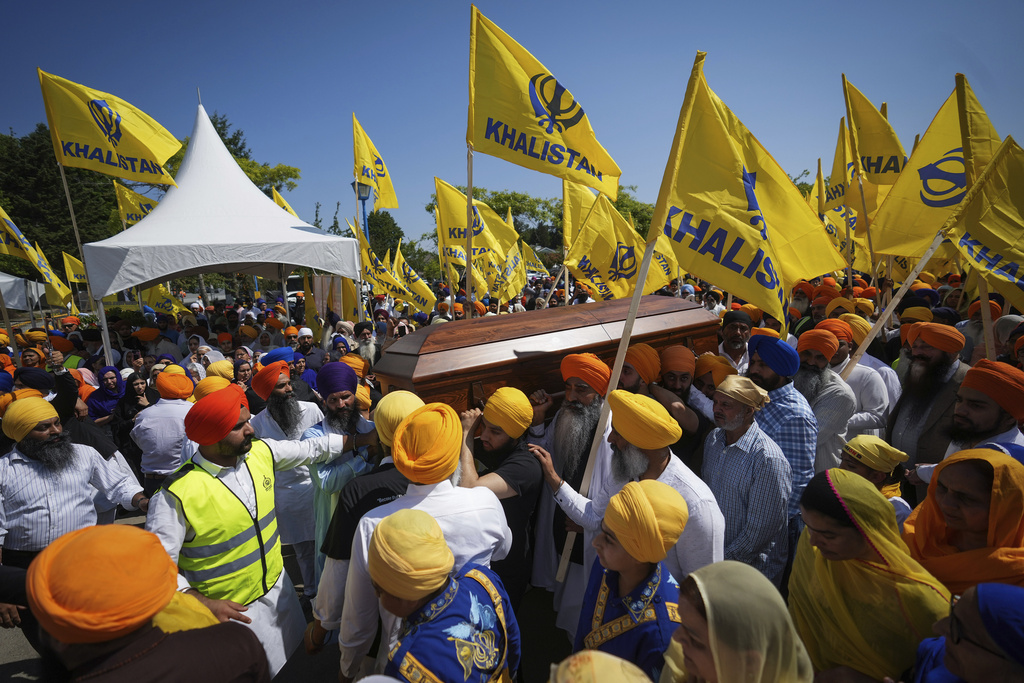Canadian Prime Minister Justin Trudeau told an emergency session of parliament on Monday that the country’s intelligence agencies are investigating “credible allegations” that the June killing of a prominent Canadian Sikh activist is linked to “agents of the government of India.”
“Any involvement of a foreign government in the killing of a Canadian citizen on Canadian soil is an unacceptable violation of our sovereignty,” Trudeau told lawmakers.
Trudeau’s announcement was followed by the expulsion of the chief of India’s intelligence agency in Canada. “Today we’re acting by expelling a key diplomat, but we will get to the bottom of this,” foreign affairs minister Mélanie Joly said.
India’s foreign ministry released a statement on Tuesday morning describing the allegations as “absurd” and said it was expelling an unnamed Canadian senior diplomat in retaliation.
Here’s what to know about the murder, the Sikh separatist movement, and how it’s affecting India-Canada relations.
Who was Hardeep Singh Nijjar?
Hardeep Singh Nijjar was gunned down in his truck on June 18, 2023, by two masked men in front of a Sikh temple in Surrey, British Columbia.
The 45-year-old, who migrated to Canada in the 1990s, was a strong advocate for the Khalistan movement, which calls for a separate homeland for the ethnoreligious Sikh community—which makes up less than 2% of the country’s population—in India’s Punjab region. At the height of an insurgency in the 1980s and 1990s, tens of thousands were killed amid armed violence between Khalistan supporters and the Indian army.

Support for the Khalistan movement has continued to reverberate in diaspora communities around the world. In Canada, which houses the largest Sikh population outside of Punjab, separatist protests sometimes take place in front of Indian diplomatic missions—a move that has triggered statements of concern from the Indian government.
Authorities in India, where Hindu nationalism has been on the rise, are known to fiercely hunt down Sikh separatists. In March, they went as far as restricting internet services for some 30 million people to hunt down another Sikh leader who supported the Khalistan movement.
Read More: India's Manhunt for a Hardline Sikh Leader Leads to Internet Shutdowns and Global Protests
Indian authorities had similarly labeled Nijjar a “terrorist,” and he was wanted by India’s National Investigation Agency for his alleged connection with the murder of a Hindu priest in Punjab—a charge that Nijjar’s supporters have denied.
Canadian media reported in June that Nijjar had been warned by “gang members” and the Canadian Security Intelligence Service that he was being targeted by “professional assassins”. Canadian investigators said last month that they’d identified three suspects in Nijjar’s murder, but no arrests have been made yet.
How is the assassination dividing Canada and India?
Earlier this month, Trudeau brought Nijjar’s murder up to Indian Prime Minister Narendra Modi on the sidelines of the G20 summit in New Delhi, he said on Monday, adding that he had urged the Indian government to “cooperate with Canada to get to the bottom of this matter.”
Meanwhile, India continues to view Sikh activists as a threat to its national security. After the two leaders’ G20 meeting, India’s foreign ministry said in a statement that Modi had in turn expressed to Trudeau his concern about anti-Indian protests in Canada. “They are promoting secessionism and inciting violence against Indian diplomats, damaging diplomatic premises and threatening the Indian community in Canada and their places of worship," the statement said.
The bilateral tensions appear to have trickled into other diplomatic engagements—most notably the on-again, off-again trade talks that the two countries have held since 2010.
Last week, Canada announced that a visit to India by its trade minister scheduled for October would be postponed, without specifying the reason for the delay. The announcement came after both countries said they had paused trade talks with each other, months after they had agreed to sign an initial agreement to increase bilateral trade and investment by this year.
Trudeau’s public announcement on Monday has only heightened tensions, with Canadian authorities vowing to “hold the perpetrators accountable and bring them to justice.”
Joly, the foreign affairs minister, also said that Trudeau has raised the issue with President Joe Biden and British Prime Minister Rishi Sunak. Neither of the governments have commented on the matter.
Trudeau’s announcement on Monday was met with support from lawmakers across the spectrum as well as from the Sikh community in Canada—including opposition leader Jagmeet Singh, the head of the New Democrat Party, who's also Sikh. “To hear the prime minister of Canada corroborate a potential link between a murder of a Canadian citizen on Canadian soil by a foreign government is something I could never have imagined,” Singh said.
“Today, the Prime Minister of Canada has publicly said what Sikhs in Canada have known for decades—India actively targets Sikhs in Canada,” said the president of the World Sikh Organization of Canada in a statement published on Monday.
“Several other Canadian Sikhs are also understood to be under threat by India and on so-called ‘hit lists’,” the statement added.
Conservative Party leader Pierre Poilievre said that Canadian citizens “must be safe from extrajudicial killings” and called on the Indian government to “act with utmost transparency” as murder investigations continue.
In response to Trudeau’s claims, India reiterated in its foreign ministry statement on Tuesday that “Khalistani terrorists and extremists” residing in Canada pose a threat to India’s sovereignty. “That Canadian political figures have openly expressed sympathy for such elements remains a matter of deep concern.”
More Must-Reads from TIME
- Donald Trump Is TIME's 2024 Person of the Year
- Why We Chose Trump as Person of the Year
- Is Intermittent Fasting Good or Bad for You?
- The 100 Must-Read Books of 2024
- The 20 Best Christmas TV Episodes
- Column: If Optimism Feels Ridiculous Now, Try Hope
- The Future of Climate Action Is Trade Policy
- Merle Bombardieri Is Helping People Make the Baby Decision
Contact us at letters@time.com